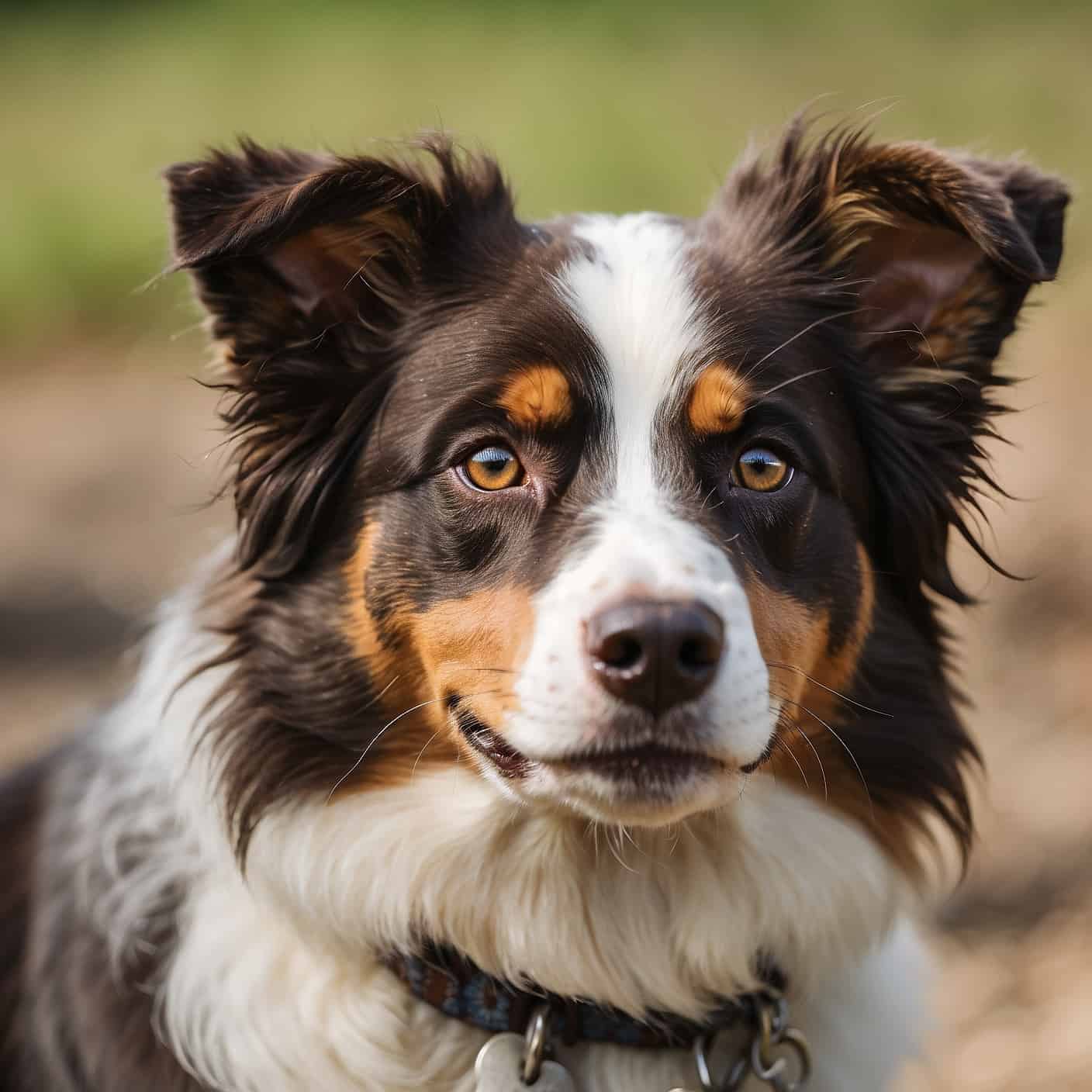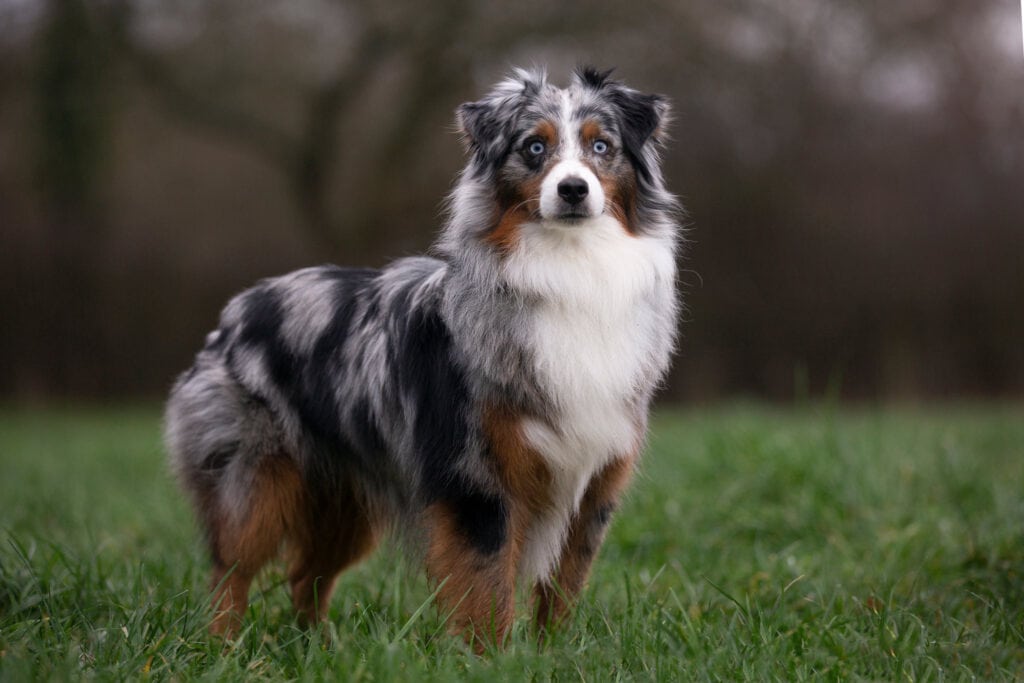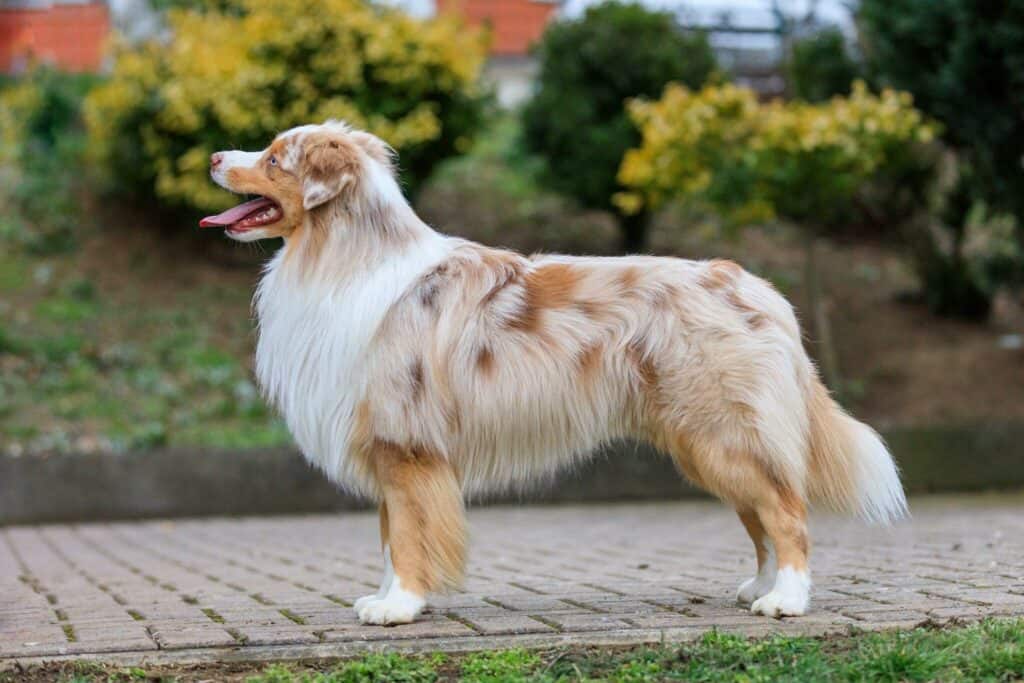The Miniature American Shepherd, a compact bundle of energy, unwavering loyalty, and remarkable agility, has become a beloved choice among dog enthusiasts and active individuals. With a heritage rooted in the United States, a distinctive appearance, and a unique set of personality traits, this breed has secured its place as an ideal companion and a versatile herding dog.

| Category (Explanation) | Breed Information |
|---|---|
| Year of Breed Conception | 1960s |
| Country of Origin | United States |
| Weight (lbs & kg) (Male) | 20-40 lbs (9-18 kg) |
| Weight (lbs & kg) (Female) | 20-35 lbs (9-16 kg) |
| Coat Type | Medium-length double coat |
| Color Variations | Various colors and patterns, including merle |
| Shedding Level (Low, Moderate, High) | Moderate |
| Height (cm & in) | 13-18 inches (33-46 cm) |
| Breed Size | Small to medium |
| Trainability (Low, Moderate, High) | High |
| Mental Needs (Low, Moderate, High) | Moderate |
| Intelligence Level (Low, Moderate, High) | High |
| Energy Level (Low, Moderate, High) | High |
| Agility (Low, Moderate, High) | High |
| Loyalty (Low, Moderate, High) | High |
| Playfulness (Low, Moderate, High) | High |
| Exercise Needs | Regular exercise and mental stimulation |
| Guarding Proficiency (Low, Moderate, High) | Low |
| Sociability with Children (Low, Moderate, High) | High |
| Barking Level (Low, Moderate, High) | Moderate |
| Digging Tendency (Low, Moderate, High) | Low |
| Destructive Behavior (Low, Moderate, High) | Low |
| Drooling Level (Low, Moderate, High) | Low |
| Obedience Level (Low, Moderate, High) | High |
| Apartment Friendly (Yes/No) | Can adapt to apartment living with sufficient exercise |
| Inherent Prey Drive | Moderate |
| Physical Risk to Others (Low, Moderate, High) | Low |
| Travel Fatality Risk (Low, Moderate, High) | Low |
| Allergen Potential | Low |
| Health Concerns (List of Common Health Concerns) | Eye Issues, Hip Dysplasia, Epilepsy |
| Average Life Expectancy (Life Expectancy in Years) | 12-15 years |
Woof Mastery is reader supported and our articles may contain affiliate links.
Instead of running third party ads that we have no control of we only use links from high-quality companies we are directly partnered with. Making use of these links come at no cost to you our reader, and in many cases have the extra benefit of discounted rates or sign up bonuses.
If you’re interested you can read more about our affiliate policy here.
We appreciate your support and always insure that the products and services we recommend are high-quality, helpful and relevant to the subject at hand!
The Miniature American Shepherd has a history closely connected to the Australian Shepherd, despite its smaller size. These dogs share a lineage with small Australian Shepherds used in the Western United States for herding duties.
Over time, breeders selectively bred smaller Australian Shepherds, leading to the development of the Miniature American Shepherd. Despite their diminutive stature, they retain the intelligence and herding instincts of their larger counterparts.
Today, Miniature American Shepherds are cherished for their compact size, intelligence, and herding abilities. They make excellent companions for families and individuals seeking an active and loyal pet.

What makes the Miniature American Shepherd special is its compact size combined with the same herding skills as its larger counterparts. These dogs are known for their agility and versatility, making them popular in dog sports and as companions for those with less space.
Despite their smaller stature, they retain the same intelligence and loyalty as standard-sized herding dogs, making them extraordinary in their own right.
Miniature American Shepherds share their traditional role with Australian Shepherds. They served as reliable herding dogs, skillfully guiding and protecting livestock. Their small size made them agile and adaptable, making them well-suited for managing livestock in diverse terrains. Today, they continue to excel in herding competitions and make wonderful family pets, preserving their heritage as capable working dogs.
Miniature American Shepherds have delightful and spirited personalities. They are known for their intelligence, agility, and a strong desire to please their owners. These dogs may be smaller, but they retain the same energy and enthusiasm as their larger counterparts.
Their intelligence and trainability make them quick learners, excelling in various dog sports and activities. They are affectionate and form strong bonds with their families. Miniature American Shepherds are characterized by their playfulness, adaptability, and a loving nature, epitomizing the ideal blend of energy and companionship.
Miniature American Shepherds are intelligent and highly active. They are loyal to their families and can be good with children and other pets. However, their herding instincts may lead to attempts to herd people or animals.
Early socialization is essential to help them get along well with others. They thrive on mental stimulation and physical activity.
Miniature American Shepherds are small to medium-sized dogs with a well-proportioned and compact build. They have a slightly rounded head with expressive oval-shaped eyes. Ears are triangular and can be either erect or semi-erect.
They have a double coat with a medium-length, weather-resistant outer coat. Coat colors are similar to Australian Shepherds and can include blue merle and red merle with marbled patterns, often accompanied by white markings. Their tail can be naturally bobbed or long and bushy.
Males typically stand between 14 to 18 inches (36-46 cm) at the shoulder and weigh between 20 to 40 pounds (9-18 kg), while females are slightly smaller and lighter.
Miniature American Shepherds have an alert and lively presence, reflecting their herding heritage and versatility.
Miniature American Shepherds come in a variety of coat colors, including:
Miniature American Shepherds often have a merle coat pattern similar to Australian Shepherds, with blue merle and red merle variations. Some may have solid coat colors without merle patterns.
Miniature American Shepherds have a moderate shedding level. They shed consistently, with heightened shedding during seasonal changes. Regular brushing and grooming can help manage shedding and promote a healthy coat.
Miniature American Shepherds have a medium-length double coat that requires regular grooming. Grooming habits for this breed include:
1. Brushing: Regular brushing, at least once or twice a week, helps prevent matting and removes loose fur. Focus on their dense undercoat with an undercoat rake or slicker brush.
2. Bathing: Bathe them when necessary, using a dog-specific shampoo and thorough rinsing.
3. Ears: Check and clean their ears regularly with a veterinarian-recommended solution to prevent wax buildup or infections.
4. Nails: Keep their nails trimmed to a comfortable length to maintain proper gait and prevent discomfort.
5. Teeth: Brush their teeth regularly to ensure dental health and prevent bad breath. Dental chews or toys can be helpful.
6. Tail and Paw Care: Maintain cleanliness in the tail and paw areas, inspecting for any signs of irritation or injury.
Miniature American Shepherds have a high activity level and thrive on physical and mental stimulation. Key points about their activity level include:
1. Exercise Needs: Miniature American Shepherds need daily exercise to maintain their well-being. Activities can include walks, runs, and play sessions.
2. Energy Level: They have high energy levels, especially when young. Regular exercise is important to prevent restlessness.
3. Herding Heritage: Historically, Miniature American Shepherds were bred for herding tasks. They excel in activities like herding trials, agility, and obedience.
4. Mental Stimulation: In addition to physical activity, mental challenges through obedience training and puzzle toys are essential.
5. Family Dogs: They are known to be good family pets and enjoy activities with their human companions, such as hiking and dog sports.
Shetland Sheepdogs are highly intelligent dogs known for their ability to learn quickly. Here are some key points about their intelligence:
Shetland Sheepdogs’ intelligence and agility make them excellent companions and working dogs. Training, socialization, and mental stimulation are crucial for their well-being.
Miniature American Shepherds are intelligent and require mental stimulation. Engage them in obedience training, agility, and interactive games to keep their minds sharp.
Social Interaction: They are social dogs and need regular interaction with their human family. Loneliness can lead to anxiety or destructive behavior, so provide companionship and attention.
Exercise: Mental exercise is crucial to their well-being. Offer them tasks that challenge their problem-solving skills.
Training and Obedience: Miniature American Shepherds benefit from obedience training, which not only stimulates their minds but also strengthens their bond with their owners. Consistent, positive-reinforcement training is effective in shaping their behavior.
Enter The Woof Mastery

Thinking about a Miniature American Shepherd? Keep these points in mind:
1. Exercise Needs: These dogs are active and require regular exercise and mental stimulation. They enjoy activities like agility.
2. Training: Consistent training and socialization are essential to manage their intelligence and herding instincts.
3. Space: They adapt well to smaller living spaces as long as they get enough exercise.
4. Coat Care: Miniature American Shepherds have a double coat that needs regular grooming to prevent matting.
5. Herding Instinct: Be prepared for their natural herding behavior, which may include trying to herd family members.
Miniature American Shepherds, though smaller in size, may still pose a physical risk to others if not properly socialized, trained, or managed. The risk assessment factors include:
1. Protective Instinct: Miniature American Shepherds may have a protective instinct, especially towards their family. Proper training is necessary to manage this instinct.
2. Socialization: Early and thorough socialization is crucial to ensure Miniature American Shepherds are comfortable around people and other animals. Poor socialization can lead to fear or aggression.
3. Training: Obedience training is essential to teach Miniature American Shepherds appropriate behavior and ensure they respond to commands. Well-trained dogs are less likely to engage in aggressive behavior.
4. Owner Responsibility: Responsible ownership involves being aware of the dog’s behavior and taking necessary precautions in public settings.
5. Breed-Specific Legislation (BSL): Miniature American Shepherds are not commonly subject to BSL, but owners should be aware of local regulations.
6. Individual Variability: Each dog is unique, and behavior can vary. Responsible ownership, proper training, and socialization are key to minimizing the potential physical risk to others.
Miniature American Shepherds are known for being good with children. They are affectionate, intelligent, and energetic, making them great playmates for kids. Their herding instincts may lead to them trying to gather and protect children, but this can be managed with training.
Miniature American Shepherds are often good swimmers, similar to Australian Shepherds. Their agility and physical build make them capable in the water. Many may exhibit a natural instinct for swimming, but individual preferences vary. Supervision and safety precautions are essential when introducing them to water activities.
Positive training practices will assist your Miniature American Shepherd puppy in becoming a well-behaved and devoted companion.
Miniature American Shepherds tend to be moderately noisy. They inherit their vocal tendencies from the Australian Shepherd. They may bark or use other vocalizations, especially when herding or when they have excess energy.
Miniature American Shepherds thrive in homes that provide:
Challenges:
Traveling with Miniature American Shepherds involves these considerations:
Miniature American Shepherds are generally healthy, but they may be prone to certain health concerns, including:
Proper nutrition is vital for Miniature American Shepherds. Follow these nutritional habits:
Proper nutrition is essential for the health and well-being of Miniature American Shepherds.
Breed-specific laws (BSL) can affect Miniature American Shepherds in certain areas, and these regulations may vary among different jurisdictions. Common BSL restrictions that may apply to Miniature American Shepherds include:
The rationale for BSL is often based on concerns about public safety and perceived risks associated with specific breeds. While Miniature American Shepherds are not inherently aggressive, they can be affected by BSL due to their physical resemblance to breeds that are sometimes included in these laws.
It’s important to note that BSL is a contentious topic, and many advocates argue that it unfairly targets breeds rather than addressing individual dog behavior. They emphasize that responsible ownership, training, and education should be emphasized instead of breed-specific restrictions.
To determine if there are breed-specific laws or restrictions regarding Miniature American Shepherds in your area, you should check with your local animal control or government authorities. Be aware of and comply with any local regulations to ensure that you are in compliance with the law while owning a Miniature American Shepherd.
Woof Mastery is reader supported and our articles may contain affiliate links.
Instead of running third party ads that we have no control of we only use links from high-quality companies we are directly partnered with. Making use of these links come at no cost to you our reader, and in many cases have the extra benefit of discounted rates or sign up bonuses.
If you’re interested you can read more about our affiliate policy here.
We appreciate your support and always insure that the products and services we recommend are high-quality, helpful and relevant to the subject at hand!
Myth 1: Miniature American Shepherds are the Same as Mini Australian Shepherds
Truth: They are separate breeds. Miniature American Shepherds have their own distinct characteristics and history.
Myth 2: They are Low-Energy Due to Size
Truth: Despite their size, Miniature American Shepherds are active dogs. They require exercise and mental stimulation like their larger counterparts.
Miniature American Shepherds, while not as widely recognized as some other breeds, have still achieved fame in their own right:
These Miniature American Shepherds have demonstrated their breed’s remarkable abilities in dog sports and have gained recognition among enthusiasts.
Miniature American Shepherds, a smaller version of the Australian Shepherd, have been cherished by families and dog enthusiasts. Their history is closely tied to the Australian Shepherd breed.
Miniature American Shepherds, like all breeds, face certain challenges and dangers. Some of the greatest dangers and concerns for the breed include:
By understanding these challenges and providing responsible ownership and care, many of these dangers can be mitigated to ensure the well-being of Miniature American Shepherds.
The Miniature American Shepherd is a smaller version of the Australian Shepherd. Its development involved breeding smaller Australian Shepherds, as well as dogs with herding and ranching abilities. The breed was selectively bred for its size while preserving the Australian Shepherd’s herding instincts.
The Miniature American Shepherd, a compact and intelligent breed, has charmed dog enthusiasts with its adaptability and affectionate nature. Whether participating in dog sports or being a beloved family companion, Miniature American Shepherds shine in various roles.
Being a Miniature American Shepherd owner involves providing physical and mental activities, training, and regular veterinary care. Responsible ownership means nurturing their herding instincts and addressing potential health concerns.
With their small stature and big hearts, Miniature American Shepherds continue to make a significant impact in the lives of those who appreciate their versatility and devotion.